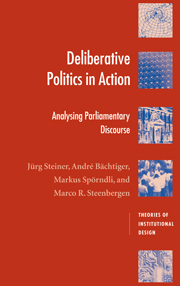Book contents
- Frontmatter
- Contents
- Acknowledgments
- Introduction: The research questions
- 1 Institutions and behavior: the example of consociational theory
- 2 The philosophical literature on deliberative politics
- 3 Measuring deliberation: a Discourse Quality Index
- 4 Understanding the real world of deliberation: hypotheses about antecedents and consequences
- 5 Antecedents of deliberation: institutions and issues
- 6 Discourse and its consequences
- Conclusion and research outlook
- Appendix: Discourse Quality Index (DQI): instructions for coders
- References
- Index
4 - Understanding the real world of deliberation: hypotheses about antecedents and consequences
Published online by Cambridge University Press: 22 September 2009
- Frontmatter
- Contents
- Acknowledgments
- Introduction: The research questions
- 1 Institutions and behavior: the example of consociational theory
- 2 The philosophical literature on deliberative politics
- 3 Measuring deliberation: a Discourse Quality Index
- 4 Understanding the real world of deliberation: hypotheses about antecedents and consequences
- 5 Antecedents of deliberation: institutions and issues
- 6 Discourse and its consequences
- Conclusion and research outlook
- Appendix: Discourse Quality Index (DQI): instructions for coders
- References
- Index
Summary
Deliberation in a Habermasian sense is an ideal type. As we discussed in chapter 3, the real world of political discourse may well fall short of this ideal. Thus, we think of discourse quality as a continuum, ranging from low levels at one extreme to the Habermasian ideal on the other. Political actors, both individuals and institutions, are located somewhere along this continuum. Our DQI seeks to measure this location. However, establishing the location of an actor on the deliberative continuum is only the first step. We would also want to know why the actor is located where s/he is and what the implications of this location are for political outcomes. This chapter is concerned with those questions. Our starting point is that the quality of discourse is not randomly determined. Rather, we believe that it is contingent on institutions, as well as the nature of the issue that is being deliberated on. These factors do not predetermine the level of discourse, but they explain meaningful variations in deliberation. This variation, in turn, has implications for political outcomes. That is to say that discourse quality influences outcomes over and beyond institutional rules.
A theoretical framework
To understand both the preconditions and consequences of deliberation, we first need to understand how it is situated in the field of social action. By comparing deliberation to other modes of political action we can see how it is different. Risse (2000) has laid much of the groundwork for this type of analysis.
- Type
- Chapter
- Information
- Deliberative Politics in ActionAnalyzing Parliamentary Discourse, pp. 74 - 97Publisher: Cambridge University PressPrint publication year: 2005

